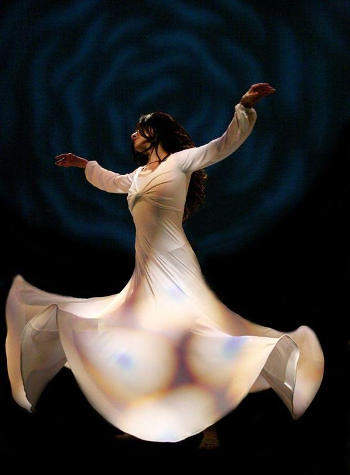by Mirabai Starr
Mira has offered herself to her Lord. The single lotus will swallow you whole.
– From “Mira the Bee”
For decades I was conditioned to believe that to engage a mature spiritual life I needed to “pick one tradition and go deep,” which implied that my attraction to the teachings and practices at the heart of all religions was superficial and indolent. Also, that the path of non-dualism—with its affirmation of undifferentiated consciousness—was superior to my devotional disposition. Also, that my experience of longing for God was an illusion—some kind of unconscious blend of unresolved childhood abandonment and magical thinking. In other words, the energy that fueled my journey was predicated on a perfect storm of delusional inclinations.
It was only when the fire of loss swept into my life and burned the scaffolding to the ground that all conceptual constructs came tumbling down and these insidious messages revealed themselves as 1) unkind, and 2) untrue. From the ashes of grief a transfigured, more authentic self began to rise, and she felt no obligation to choose sides. She was a Jew and a Sufi, a believer and an agnostic. She practiced Vipassana and Centering Prayer, observed Shabbat and received communion. She rested in blessed moments of unitive consciousness and sang the praises of Lord Krishna.
I am not alone. A tribe of people is coalescing around the world to celebrate a reorientation from religious separation to interspiritual connection. While many of us have been pilgrims on this path for decades—sometimes feeling alone in the wilderness, sometimes gathering with other seekers who are similarly drawn to worshipping the sacred in every single holy house we encounter—now, at last, our numbers seem to be reaching a tipping point and what was a fringe phenomenon is becoming a global movement.
The interspiritual path is characterized as much by what it is not as what it is. It is not a new religion; in fact many of its most enthusiastic adherents consider themselves “spiritual but not religious.” It has no creed or dogma, no tenets or prohibitions. No special attire sets it apart and no single symbol represents its core philosophy. Its membership is as diverse as the full spectrum of humanity. It is not about belief, but action. And the only action required is love.
The mystics of every tradition—and those whose hearts thrum with yearning for God but do not have any religious affiliation—embody this Way of Love. The language the mystics speak is the Language of Love. Drenched in love-longing, the mystic dissolves into the ocean of the One. Mystical poetry transcends theological distinctions and neutralizes ideological ultimatums. These love poems to God do not describe Ultimate Reality: they evoke it. The poems of the mystics slip past the thought-guardians and batter down the gates of the heart. In crying out to the Holy One, the ecstatic poets offer us a direct connection with the object of their souls’ deepest desire, and ours. Mystical poetry generates a sacred field, and invites us to step in.
See if these snippets knock on your heart-door:
This longing is dear to me.
This longing makes every place sacred.
This longing,
Too large for heaven and earth,
Fits inside my heart,
Smaller than the eye of a needle.
(Rumi)i
When he spoke my soul vanished.
I look for him and can’t find him.
I call, he doesn’t answer…
I beg you, daughters of Jerusalem,
If you find my love
You will say that I am sick with love.
(Song of Songs)ii
All night I could not sleep
Because of the moonlight on my bed.
I kept on hearing a voice calling:
Out of Nowhere, Nothing answered “yes.”
(Zi Ye)iii
Oh, living flame of love,
how tenderly you penetrate
the deepest core of my being!
Finish what you began.
Tear the veil from this sweet encounter.
(John of the Cross)iv
Listen, my friend,
This road is the heart opening,
Kissing his feet,
Resistance broken, tears all night.
(Mirabai)v
… and finally, insane for the light,
you are the butterfly and you are gone.
And so long as you have not experienced this:
To die and so to grow,
You are only a troubled guest on the dark earth.
(Goethe)vi
The highest calling of the mystic is not to become enlightened, but rather to become nothing, to utterly disappear into the One. What madness! And yet the mystical path is all about paradox. When lover merges with Beloved, all separation melts and only love remains; there is no one left to long nor any object of longing, and this, to the mystic, is good news. Mystics claim their experience of union is ineffable, and yet they cannot resist expressing their encounter in lush poetic language. Mysticism is characterized by annihilation: the soul is the moth inexorably drawn to the flame. In burning to death, lover is transformed in Beloved, individual self yields to its oneness with the Divine, the dream of exile ends and the spirit comes home to its source.
It is here, in the center of the perennial paradox, that it becomes obvious all spiritual paths emanate from and return to the same universal heart. This is where the only possible response to the quiet blessing of union with the One is the passionate outpouring of love-language. Here, longing for God is not a malady to be cured or a broken thing that needs repairing, but a shattering of the cup of the heart so that, within the vast spaciousness that opens, the Mystery may come pouring in and lift us into the arms of Love itself.













